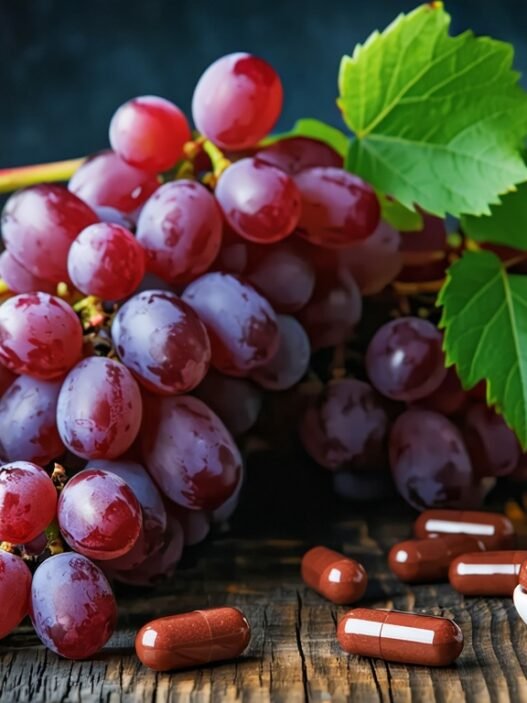Understanding Resveratrol
Definition and Sources
Resveratrol is a naturally occurring plant compound classified as a polyphenol, primarily found in sources like grapes, red wine, berries, and peanuts. It has garnered attention for its health-promoting properties, particularly in skin care. The antioxidant effects of resveratrol make it particularly valuable in anti-aging formulations. This compound is sought after in modern skincare due to its ability to neutralize free radicals—the harmful molecules that can damage skin cells and accelerate the aging process.
Here’s a quick overview of common sources of resveratrol:
| Source | Resveratrol Content |
|---|---|
| Grapes | High |
| Red Wine | High |
| Berries | Moderate |
| Peanuts | Moderate |
Antioxidant Properties
The antioxidant properties of resveratrol play a crucial role in skin health. This compound helps protect against oxidative stress caused by environmental factors, such as UV exposure and pollution. Such stress is linked to the onset of fine lines, wrinkles, and loss of skin firmness. Studies suggest that resveratrol not only neutralizes free radicals but also enhances collagen synthesis, reducing the visibility of wrinkles and improving skin elasticity (PubMed Central).
In addition to mitigating visible signs of aging, resveratrol helps defend the skin’s natural barrier function, which reduces the appearance of redness induced by environmental stressors. Its ability to interact with various biological pathways enhances the skin’s resilience and overall appearance.
To learn more about the benefits associated with resveratrol, check out our comprehensive guide on resveratrol benefits. Additionally, resveratrol’s health benefits extend beyond skin care, potentially impacting cardiovascular health and providing neuroprotective effects, which can be explored further in our articles on resveratrol health benefits and resveratrol research.
Benefits of Resveratrol for Skin
Resveratrol is gaining recognition in the skincare industry for its wide array of benefits, particularly for aging skin. This powerful compound not only helps mitigate signs of aging but also enhances overall skin health.
Anti-Aging Effects
Resveratrol has been shown to significantly improve fine lines, wrinkles, and skin elasticity through topical application. A study conducted in 2014 demonstrated these benefits after just 12 weeks of use. By inhibiting the phosphorylation of survivin, resveratrol slows down the skin aging process and reduces edema and inflammation in the skin. Its antioxidant properties combat oxidative stress, contributing to the reduction of wrinkles and promoting a youthful appearance.
| Skin Concern | Improvement from Resveratrol |
|---|---|
| Fine Lines | Significant reduction |
| Wrinkles | Notable lowering |
| Elasticity | Enhanced firmness |
UV Protection
This compound provides essential protection against the harmful effects of UVB radiation. Resveratrol enhances collagen synthesis and reduces the impact of photoaging, making it a valuable ally for those looking to protect their skin from sun damage. Its anti-inflammatory and antioxidant properties further contribute to skin defense against UV-related damage, thus promoting healthier skin overall. The positive effects of resveratrol underscore its importance in the formulation of anti-aging skincare products.
Skin Hydration and Texture
Resveratrol supports skin hydration and improves texture by facilitating skin regeneration and increasing the concentration of endothelial growth factors. This process leads to effective wound healing and scar reduction, which can enhance the overall smoothness of the skin. Studies have shown that resveratrol accelerates wound healing and diminishes scarring, making it particularly beneficial for individuals concerned about skin imperfections.
For additional insights into how resveratrol can improve skin health, including its other benefits, visit our page on resveratrol skin benefits. Its inclusion in topical formulations not only maximizes hydration but also promotes overall skin vitality, aligning perfectly with the goals of longevity and anti-aging enthusiasts.
Resveratrol in Skincare Products
Topical Application
Topical application of resveratrol has become a popular approach for enhancing skin health, particularly for its anti-aging benefits. Studies indicate that applying resveratrol directly to the skin can significantly improve fine lines, wrinkles, and elasticity. A notable study conducted in 2014 revealed that consistent application over 12 weeks yielded visible results in skin texture and firmness.
In contrast to consuming resveratrol through dietary sources, such as red wine, grapes, peanuts, or dark chocolate, topical application allows for direct penetration into the skin. This method ensures that the beneficial properties of resveratrol are utilized more effectively for skin health and rejuvenation (Healthline).
Efficacy in Formulations
Resveratrol is frequently incorporated into various skincare formulations, including face creams, serums, and ointments. These products are tailored for both preventive and corrective skincare regimens, making them valuable for addressing signs of aging, dullness, and dehydration. The efficacy of resveratrol can be further enhanced when combined with ingredients such as hyaluronan, lipid nanosystems, organogels, or nanoparticles. These combinations have shown promise in reducing wrinkles, inflammation, and effectively treating skin conditions like acne vulgaris and atopic dermatitis.
Prominent brands such as Paula’s Choice, Dr. Dennis Gross, and IMAGE Skincare have innovatively formulated resveratrol products that aim to protect, nourish, and restore the skin. By integrating resveratrol into their offerings, these brands contribute to advanced anti-aging treatments that help to achieve a glowing complexion and improve overall skin health.
When choosing skincare products containing resveratrol, it’s essential to look for reputable brands and to consider combining them with other complementary ingredients for optimal results. For more insights on the benefits of resveratrol, explore our article on resveratrol skin benefits.
Health Benefits of Resveratrol
Resveratrol is gaining attention not only for its skin benefits but also for its overall health advantages. Research indicates it may play a vital role in enhancing longevity and managing various health conditions.
Neuroprotective Effects
Research has revealed that resveratrol exhibits protective effects against neurodegenerative disorders such as Alzheimer’s, Parkinson’s, and Huntington’s diseases. It enhances mitochondrial functions via the SIRT1/AMPK/PGC1α pathway, which is crucial for energy production in neurons. This compound can reduce oxidative stress, promote clearance of β-amyloid peptides, and diminish neuronal apoptosis, thereby supporting cognitive function. A study published in the Journal of Alternative and Complementary Medicine demonstrated that supplementation with resveratrol improved cognitive function in elderly individuals after 90 days (Journal of Alternative and Complementary Medicine).
Cardiovascular Benefits
Resveratrol has been linked to several improvements in heart health. It aids in the enhancement of left ventricular function, diminishes cardiac hypertrophy, and lessens interstitial fibrosis. The molecular mechanisms contribute to these benefits include inhibiting prohypertrophic signaling and improving myocardial Ca2+ handling. Regular intake of resveratrol may also help regulate cholesterol levels and support heart health, making it a valuable addition for those looking to maintain cardiovascular wellness.
| Health Aspect | Resveratrol Effects |
|---|---|
| Neuroprotection | Enhances cognition, reduces neuronal apoptosis |
| Cardiovascular Health | Improves heart function, reduces cardiac hypertrophy |
Renal Function Improvement
Emerging evidence suggests that resveratrol can positively impact renal function. A systematic review and meta-analysis indicated that supplementation with resveratrol could lead to mild improvements in kidney function among adults (Nutrition Research). These findings highlight the potential of resveratrol not only as a supplement for skin health but also for overall organ health, particularly in aging populations.
Exploring resveratrol as part of a wellness routine can yield significant advantages spanning beyond skin care. For those interested in integrating this powerful compound into their lifestyle, options include resveratrol supplements and various resveratrol foods.
Safety and Dosage of Resveratrol
Understanding the safety and appropriate dosage of resveratrol is crucial for those considering it for its potential skin benefits and overall health.
Dosage Considerations
Resveratrol supplements typically range from 250 to 500 milligrams, which is substantially lower than the amounts suggested in research for achieving beneficial effects. Studies have indicated that a daily intake of about 2 grams may be necessary to reach levels associated with those benefits (WebMD).
| Form of Resveratrol | Recommended Dosage |
|---|---|
| Supplements | 250 – 500 mg |
| Research Doses | ~2,000 mg |
It is important to note that there are no specific dosage recommendations from authoritative bodies. Consumers should exercise caution and consult healthcare providers when considering resveratrol, especially if they have underlying health conditions or are taking other medications.
Side Effects
Generally, studies have not reported severe side effects associated with resveratrol, even at higher doses. It is generally considered safe when consumed in amounts found in food. However, individuals allergic to grapes or wine should use caution. Those with bleeding disorders are advised to consult with a healthcare provider before using resveratrol, as it may increase bleeding risk (WebMD).
Precautions and Interactions
While resveratrol shows promise in various studies, certain populations should exercise particular caution:
- Children: No established safety data for children exists; consulting a physician is advised.
- Pregnant and Breastfeeding Women: There is insufficient research to ensure safety and efficacy in these groups.
- Individuals on Medication: Those taking medications should consult with their healthcare provider, as resveratrol may interact with other drugs, potentially diminishing their effectiveness.
An important concern in research has been related to the effects of high doses in animal studies, which have shown links to cardiac inflammation, kidney damage, and other adverse effects (NCBI). Additionally, resveratrol may exhibit cytotoxic effects at doses used in chemotherapy, raising concerns about its safety in specific contexts (NCBI).
Healthy aging enthusiasts should consider the benefits of resveratrol and use it prudently, being aware of individual health circumstances and existing conditions. For more insights on the benefits of this compound, check out the section on resveratrol benefits.
Future Outlook of Resveratrol
Potential Applications
The applications of resveratrol are expanding beyond traditional dietary supplements. There is promising potential for its use in cosmetology, dermatology, and plastic surgery. Resveratrol can be incorporated into anti-aging products, topical treatments for scars and wounds, and possibly even in the pharmacotherapy of various dermatoses. This versatility makes it a valuable ingredient in both preventive and corrective skincare routines.
By utilizing resveratrol in formulations such as face creams and serums, manufacturers can address multiple skin concerns including dullness, dehydration, and signs of aging. Such products not only contribute to more youthful skin appearance but also help restore a glowing complexion (Dermstore).
Ongoing Research
Research continues to unveil the myriad benefits of resveratrol. Studies have demonstrated its effects on cardiovascular health, emphasizing its role in enhancing left ventricle function, decreasing cardiac hypertrophy, and reducing inflammation in the body. The ongoing evaluation of resveratrol’s molecular mechanisms aims to uncover further potential applications, particularly in the context of chronic diseases and anti-aging.
Additionally, the field of dermatology is looking at resveratrol not just for its cosmetic benefits, but also for its healing properties related to skin conditions. As research progresses, the understanding of how resveratrol interacts with various skin types may lead to more personalized skincare solutions.
Consumer Perspectives
Consumer feedback on resveratrol products is overwhelmingly positive. Many users rate resveratrol-based products highly, with averages between 3.96 to 5 stars out of a maximum of 5, indicating their effectiveness and user satisfaction in revitalizing and maintaining skin health (Dermstore). These high ratings suggest a strong consumer interest in incorporating resveratrol into their skincare regimens.
As awareness of the anti-aging and health benefits of resveratrol grows, more consumers are likely to seek out products containing this powerful antioxidant. The promising research and consumer satisfaction indicate that resveratrol is poised to become an essential ingredient in the future of skin care and health optimization. For comprehensive insights into the benefits of this compound, refer to our articles on resveratrol benefits and resveratrol health benefits.





















